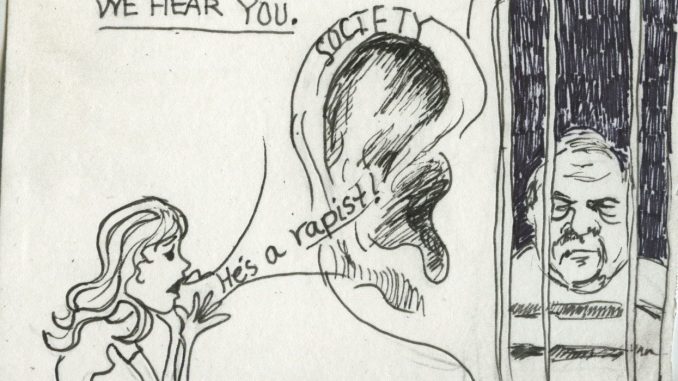
On Monday, Feb. 24, Harvey Weinstein — once one of the most powerful men in Hollywood — was convicted on two of five charges of rape and sexual assault. He now faces up to 29 years in prison; if found guilty of similar charges in Los Angeles, it may be more.
The extent of Weinstein’s long, dark history of sexual assault, harassment and rape stretches back decades. For years, there was a common knowledge of rumors relating to Weinstein’s actions, but most chose to keep quiet.
That changed in the fall of 2017, when The New York Times broke the news that numerous women had accused Weinstein of sexual harassment. Shortly after, more survivors came forward with similar stories of unwanted physical advances and other instances of sexual assault. The news of Weinstein’s accusers coming forward helped popularize the #MeToo movement, a social media movement founded by Tarana Burke that encouraged survivors of sexual assault and rape to share their stories.
Following two years of more accusations, charges and settlements, Weinstein’s New York trial finally began on Feb. 18, and just six days later, he was convicted of the aforementioned charges: criminal sex act in the first degree and third-degree rape.
Besides being a massive victory for the survivors of these assaults, and the expansive number of women who are survivors of Weinstein’s aggression, these convictions are also a victory for survivors everywhere. Court cases have the power to send a message, and in cases so highly publicized, this message is inevitably a loud one. When Brett Kavanaugh was found not guilty of sexual assault, the dangerous messages were loud and clear — a man can commit an act of sexual violence, and still go on to serve on the highest court in our country; and unless they had perfect evidence, survivors would not be believed.
The jury’s decision in the Weinstein trial sends a much different, more hopeful message. It tells us that a man who was once considered to be extremely powerful, and was — at the time of the initial accusations — extremely wealthy, isn’t above the law. It provides hope that we may see a time when the judicial system believes survivors, and doesn’t let rapists walk the streets.
Sadly, we’re not there yet. Survivors still often feel discouraged from coming forward, and when they do, and in the rare chance their case is brought to court, our judicial system is the farthest thing from helpful in their healing. They’re subjected to long, grueling trials in which they’re not only forced to recount their experiences of sexual violence, but are often times accused of lying, humiliated and shamed for telling their truth.
In court, survivors are expected to recite their experience moment to moment, not missing any detail. Our justice system is extremely ignorant to how trauma affects ones mind, and chooses to ignore all we know about trauma — that it has the ability to lessen or even completely erase memories. Even without trauma involved, these details are often so specific that expecting anyone to be able to relay them is unfair and unjust.
We commend those involved in the Weinstein trial for believing survivors and not letting a man capable of such evil as Harvey Weinstein free to commit more harmful acts. We stand with all the survivors who came forward against him, and all survivors of sexual violence of any kind.
Some days, it seems like a society in which survivors can feel comfortable reporting their assaults is out of reach. At times like this past week, however, when a message of support for these survivors is sent to an entire country listening, hopes of a better tomorrow for victims of sexual violence feels closer than ever.
